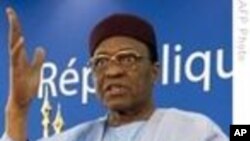<!-- IMAGE -->Sadly, Niger has joined the growing list of African nations jolted by struggles over presidential power. In a push to hold a referendum to extend his rule, President Mamadou Tandja has taken actions that threaten stability and democracy in his country and the United States is monitoring the situation there closely.
The crisis began last month when Niger's highest court ruled illegal a bid by President Tandja to conduct a referendum aimed at amending the constitution so as to allow him to run for a third 3-year term. The president, who is due to leave office when his second term ends late this year, responded by dissolving the court and announcing that he will now rule by decree. Tensions have risen as he declared a state of emergency, dissolved the National Assembly, briefly detained prominent opposition leader Mahamadou Issoufou and ordered a crackdown on the nation's media outlets to limit discussion of his actions.
The African Union has sent a delegation to Niger to help the parties settle their differences and find a peaceful resolution to the crisis. The Economic Community of West African States is also concerned and in a statement said economic sanctions may be imposed against the president if his actions contravene democratic principles. That would be unfortunate since they could have the added consequences of hurting the nation's citizens too.
Niger has made much progress in recent years toward promoting good governance and the rule of law. President Tandja's recent actions undermine this progress and the U.S. will consult and work with its partners in the region to help resolve the crisis.
The crisis began last month when Niger's highest court ruled illegal a bid by President Tandja to conduct a referendum aimed at amending the constitution so as to allow him to run for a third 3-year term. The president, who is due to leave office when his second term ends late this year, responded by dissolving the court and announcing that he will now rule by decree. Tensions have risen as he declared a state of emergency, dissolved the National Assembly, briefly detained prominent opposition leader Mahamadou Issoufou and ordered a crackdown on the nation's media outlets to limit discussion of his actions.
The African Union has sent a delegation to Niger to help the parties settle their differences and find a peaceful resolution to the crisis. The Economic Community of West African States is also concerned and in a statement said economic sanctions may be imposed against the president if his actions contravene democratic principles. That would be unfortunate since they could have the added consequences of hurting the nation's citizens too.
Niger has made much progress in recent years toward promoting good governance and the rule of law. President Tandja's recent actions undermine this progress and the U.S. will consult and work with its partners in the region to help resolve the crisis.




